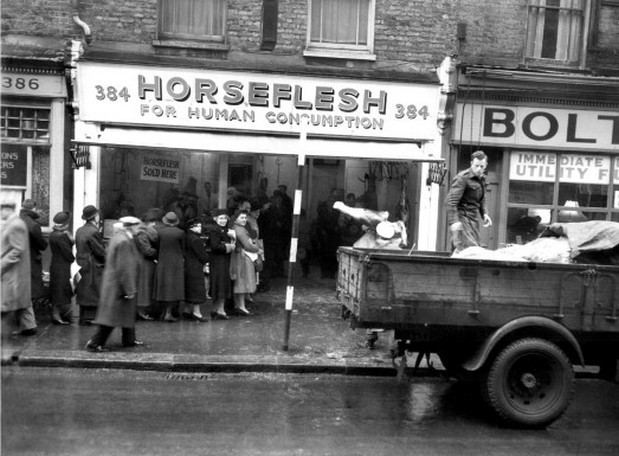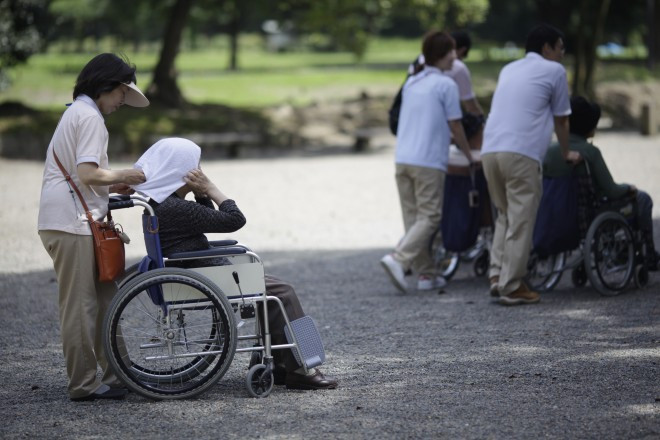Horsemeat Crisis: 'I Ate Horse at Wedding' - Britain and Horsemeat Revealed in Images

Rare images and newly unearthed film reveal Britain's very confused relationship with horsemeat.
One photograph published here by IBTimes UK reveals Britons were not always so squeamish about tucking into equine flesh.
The image depicts a line a people queuing out the door of a shop, brazenly named 'Horseflesh for Human Consumption.'
It is believed to have been taken during the era of rationing during or after World War II - when meat was dear and people were willing to eat cheaper cuts.
Not all that different from today then, when industry experts say our demand for low price meat gives manufacturers an incentive to cut corners and drive down costs in any way possible.
Taken in what is believed to be Brixton, the image from a previous age of austerity shows people had no problem with wolfing down horsemeat - if it saved a few pence on the family budget.
One woman who lived through the Sheffield Blitz in World War II recalled eating horsemeat at a wedding. The foodstuff was a commonly used substitute for beef and other meats in British, said Joyce Ambler.
She told BBC how her family whipped up a buffet for her brother's wedding.
"She [her mother] decided that we would stand in the queue at the butcher's shop and get some horse meat.
"She bought this enormous piece of horsemeat which was roasted and used for the wedding buffet. I did try this horsemeat. It cut like beef, but it had a different flavour, and I reckon one or two of the guests cottoned on that it was different, but nobody complained.
"It was edible, maybe a sort of sweeter flavour, but none of us complained. It was a luxury to get quite a lot of meat."
What a contrast from today and the horror which has greeted revelations that dishes on sale in supermarkets and served up in schools and hospitals are laced with horsemeat.
Today, the deepening horsemeat crisis shows no signs of abating, with a poll by GMI showing that 36 percent of people fear buying processed meat because they do not trust what labels say.
An ICM poll found that 45 percent of shoppers will avoid buying meat from big-name supermarkets including Asda, Tesco, Iceland, Aldi and Lidl.
The horsemeat crisis has even made five percent of us consider turning vegetarian by refusing to but meat of any kind.
For a more familiar reaction to horsemeat, a newly unearthed newsreel by British Pathe from 1948 sheds light.
Mirroring today's scare, the headline on the black-and-white footage screams "horsemeat scandal."

It goes on to report how black market gangs bought horses to slaughter and sell as meat.
A narrator says: 'Public feeling grows against this sinister trade. The country demands action against a traffic so alien to the British people.
"Horse meat is rapidly becoming part of Britain's diet. Three million people buy it every week, but less than half that number know it.
"Only one in three buys from the butcher who sells at the controlled price of a shilling a pound.
"Young horses in the prime of life, even mares with their foals, are all meat to such marketeers. In a little over three years a quarter of a million horses have been killed."
A common factor of British Pathe's newsreel and today's still-unfolding horsemeat scandal is that people were ignorant of what they were really eating. Predictedly, the reaction was shock and dismay when revealed.
In contrast, the line of people queuing outside 'Horseflesh for Human Consumption' could have no doubts whatsoever.
Attitudes to horsemeat in Britain obviously changed according to circumstances, but one contanst is that diners like being to choose to say yay or "neigh" to horsemeat.
© Copyright IBTimes 2025. All rights reserved.






















